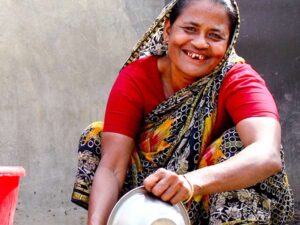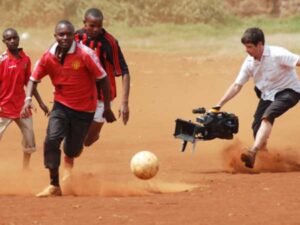The Oxford Character Project is a research and education institution striving to support people everywhere in growing leadership skills and values.
Anjali Sarker of Oxford Character Project spoke with Erica Edwards on April 13, 2023. Click here to read the full conversation with insights highlighted.
Erica Edwards: To start, could you please introduce yourself, your role, your organization, and the problem you work to address?
Anjali Sarker: My name is Anjali Sarker, and I am the program director of the Global Leadership Challenge, which is part of the Oxford Character Project at the University of Oxford. My role is to design, develop, and deliver leadership programs for young people. And by young people, I’m talking about students who are studying at the University of Oxford, but also youth and young professionals around the world. The Oxford Character Project started in 2014. One of the questions that really gave birth to this project is, we know that at elite universities like Oxford, we are educating leaders and we are producing leaders, but are we producing good leaders? If you look around the world, there are so many crises – the climate crisis or political challenges around the world. It’s not just technical problems we are talking about, we are talking about people and their decisions, and where we are heading.
In our understanding, we think that we are living in a world that is over managed but under lived. Can we show a different leadership vision to the young generation? Can we make sure that the leaders of tomorrow are working for public good, not personal gain? Those were some of the key inspirations behind starting this project.
We are an interdisciplinary research initiative, but unlike many other academics out there, we don’t only do research, we also do education. We teach students and young professionals. We also build partnerships around the world, because how many people can come to places like Oxford and enjoy this world-class education and the other resources that this university has to offer? I come from Bangladesh and I have seen firsthand what it’s like to be in a resource constrained environment, what it’s like when you cannot take education for granted, you cannot take anything for granted.
Oxford is a very elite, very privileged community that most of the world will never come to. If Oxford really wants to live up to its name, Oxford needs to go to the world. Oxford needs to open its doors and make sure its resources are accessible, its resources are relevant, and they make sense to the world’s population. That’s my actual job responsibility, what I’m trying to do here in Oxford and otherwise.
Erica Edwards: Could you tell me a little bit more about the program and what makes your approach more distinct, compared to others?
Anjali Sarker: Leadership development is a crowded space. It’s a massive industry. Starting from educational institutions to other independent providers, governments, private sector, everyone’s talking about leadership, everyone wants to train leaders, everyone has great expectations from leaders.
When we talk about leadership development, we often talk about a very specific popular set of competencies and skills. For example, I studied here at the business school, and in all the leadership trainings that I received from the school and some other places too, we talked about how to build your confidence, how to communicate better, how to stand in a certain way, how to fit into a specific mold of leader that we are very familiar with. If you talk about leadership role models, if you go to the media, you will see people like Elon Musk, Jeff Bezos, Bill Gates and the likes.
Somehow, we have associated word leadership with the best, the brightest, the richest, use your superlatives, but it’s something that is reserved for a very small group of privileged people. That group is never going to get bigger. Our alternative vision for leadership is seeing how leadership can work for everyone. Not just for the top of the pyramid, not just for the middle, but how can it work for every single person? We believe that everyone can act like a leader, everyone can exercise leadership from where they are. So, if you are a person who’s serving at a restaurant, or if you are a person who’s cleaning up the floor, you should be able to feel that in your job, in whatever your duty is, you are leading in a certain way. Now, that is not recognized by the world, but it should be.
When we talk about leadership, we talk about the human values that underpin our leadership. We don’t just talk about competencies – like how to communicate better or how to network. We talk about humility, we talk about courage, we talk about justice, we talk about hope and gratitude and love. It’s a character-first approach. We are not just talking about technical skills and competencies and trying to impress others, we are talking about the core fundamental values that will bring us together. These have brought us together as humanity for a very long time, but somehow we are kind of missing that narrative.
Leadership has become about achieving certain positions and everyone wants to be in leadership positions, but when it comes to tough decisions and choices, then it’s difficult to practice honesty and courage. We talk about those human values, and I feel that is what differentiates us from other leadership programs and other initiatives out there.
Erica Edwards: Can you share an example that illustrates the impact of your work?
Anjali Sarker: The Global Leadership Challenge that I started back in 2019, 2020, was sort of my response to Oxford’s approach to leadership. It’s an annual conference where we bring together hundreds of leaders from a very competitive pool of wonderful people around the world. Last year, we received around 4,000 plus applications for 400 spots. We select young professionals, students, young and emerging leaders and offer them leadership development training and put them into groups to work on the sustainable development goals (SDGs). We tend to believe that the United Nations SDGs are the responsibility of the government or international organizations. Big people will make big decisions and we are simply powerless individuals. But we try to change the narrative and empower young people to do small things in their own communities.
It’s not about large institutions and people in decision making deciding the future for us, but what can we do from where we are and with what we have? I’m not Bill Gates, but can I do something in my community tomorrow? We try to shift the narrative in a way that gives power back to people, especially back to young people. And it has been tremendous to see the impact, how people feel that their actions matter, their role in society matters, and they can do something, even in very small ways. You might not be successful tomorrow and your initiative might not change your country tomorrow, but it creates a ripple effect. If you start doing something, if you start taking small steps, in the future, after a certain point, that will inspire other people and your circle of influence will expand more and more. That’s what we are seeing in the global leadership challenge so far.
Erica Edwards: Is there a specific person that comes to mind, that you think is a really strong example of how you cultivated leadership, and this leader had an impact on a community in Oxford or wherever they reside?
Anjali Sarker: The person who comes to my mind is Sarge from the Philippines. He runs a community-based education initiative and after our program he feels very inspired and is pursuing partnerships. He’s probably 26 or 27, a young guy, and he’s pursuing things that are much larger than what people like him do at his age. He’s trying to partner with the government and get his initiative off the ground. He is training other young people and supporting them with a meaningful education. So, he’s creating a community-based model where, through peer learning and other methods, they can teach each other and help each other to understand what opportunities are out there and how to make the most of them.
Erica Edwards: What insights or teachable lessons can be taken from your work that others could use?
Anjali Sarker: That’s an interesting question, because I think it really depends on who you are and where you work. you are who you are. Are you an educational institution? Are you connected to leaders? Are you a government? Are you a business person? But overall, our focus on character and having a plan of how to actually embody the values in the workplace. Many people talk about diversity and inclusion. It’s one thing to put inclusion on your website. It’s a completely different thing to practice, day in and day out. One of the insights that we have, coming from our research and from running our programs, is a strong focus on character, putting character first, means you are not prioritizing one value over another. So, for example, if you want to develop better health, you cannot just go to the gym, perform a certain workout, and expect to become a healthy person. You need to eat well, you need to live in a location that isn’t polluted, you need to be physically active. It’s a balanced approach.
We just published a big UK business value survey where we studied 200 companies and what they say publicly on their websites and reports. We saw that collaboration is talked about the most. It is the top most cited value in all those sources. Hope and humility and gratitude, these are the lowest ones. So, we have a long list of all these values and you cannot expect people to collaborate well, unless you are focusing on humility and hope and the other things that aren’t appreciated as much, but are very important.
We say that there are connections between all these values and virtues. You need one to support another, and the combined effect becomes a lot more powerful than just talking about, “Oh, we are a very collaborative company.” or “We are very inclusive,” “We are very diverse.” We focus on the holistic whole rather than bits and pieces.
Erica Edwards: How do you measure success, and what is the evidence that you’re making progress?
Anjali Sarker: We have some quantified metrics that are already there because, fundamentally, we are a research group. We study all the programs we run. We do pre-program [surveys], and in the middle of the program we do another survey. At the end of the program, that’s the post-program evaluation. Integrating research and practice has been our mode of operation from the very beginning, because our grants are research grants, it has to come with program and research together. From the research, we see clear indications of how young people are experiencing an increase in certain virtues, like their sense of vocation, their level of gratitude, their sense of hope. That gives us hope that these programs are actually helping people develop the virtues that we admire.
In terms of other more non-research indicators, we started as a very small research initiative, then we started working with students in Oxford, and this year we expanded our program to two other countries, with another one in the pipeline. In terms of how many students we are reaching and how many organizations and other partnerships we are building, that’s one of the biggest indicators that we care about. How we are scaling up and not keeping all our materials, the research reports and program materials, to ourselves. We are computing things and putting that on public domains, so that other people feel inspired and can reach out to us and contextualize some of these learnings for their own educational curriculum or other initiatives. The more we see how people are taking that up in different places, the more we feel that it is making an actual impact.
Erica Edwards: Every social change model has strengths and limitations, what do you see as the main limitations of your work?
Anjali Sarker: I think if you ask this to changemakers, we are tempted to say we don’t have funding to do what we want to do. That’s a very common and obvious one. Funding aside, I think we are fighting against massive misconceptions about what leadership can be and what leadership should be. So, when I say the word humility, before coming to this program I thought humility meant not speaking up, not owning your success, being a “modest woman”. But humility means much more than that. The way we understand it, and many other academics and different disciplines understand it, humility is about being secure in your own strengths, acknowledging your weaknesses, and being able to accurately assess where you stand. And that means, of course, you own your success, but it doesn’t make you superior over another person. There’s no one who’s superior, there’s no one who’s inferior. You treat everyone as equal because you are just another human being expressing the surface of art. That is what humility truly is.
Even the word character, when you say it, people kind of feel you are imposing something on them. And can character be developed? Isn’t it something that you are born with? In terms of promoting our programs and building new partnerships, we are fighting against how people currently perceive leadership versus what it should become. There’s a gap between commonly understood definitions and descriptions of some of the things that we talk about versus our actual understanding of it. That’s probably a fuzzy answer when it comes to challenges, but it’s a whole narrative. When everyone else is talking about leadership in a certain way, celebrating certain leaders more than others, it’s difficult to create and promote an alternative type [of leadership].
Erica Edwards Are you working to advance system level change in your field? If so, how specifically are you doing that?
Anjali Sarker: The phrase system level change can be quite confusing, what counts as a system level change and what doesn’t? If that practically means building partnerships and opening doors for people who otherwise would never be able to access the resources, working not with the Harvards and Cambridges but with second or third tier universities in developing countries, and treating them as equal, learning from them, then I would say, that’s the beginning of some system level change. This is me talking personally about my experience, but I shouldn’t have to come to Oxford to learn what humility means and how to practice it. I should have learned it when I was a high school student back in Bangladesh trying to figure out what I should study next. Many of the things that we cover in this program, in our work, that we feel are truly valuable for leadership, these things are not rocket science. They don’t require expensive setups or scientific equipment or anything fancy.This understanding, this educatio, this knowledge should be available to anyone and everyone out there. But that’s not the case.
One example is, we are trying to develop an online course that will be freely available and accessible, at least to people in the world who have internet access, and we will put our best resources there. There are different initiatives that we are trying out to see if we can create a movement, if we can attract other people who are also thinking about leadership. All the educational institutions, they talk about building leaders, but there are ways to do it better, there are ways to make it more inclusive, there are ways to bring more diverse voices in because we are only studying the Western-centric models and ideas and some philosophers who passed away 400, 500 years ago. We can do better, but we cannot do it alone, sitting in Oxford. So we are trying to build impactful partnerships with people and institutions in the global south. Hopefully, that will make the word leadership and what it means a lot more global, and create different narratives that will be helpful for many other people in the future. I cannot claim that is changing the systems already, but hopefully that’s a seed and it’ll transform, at least, some people and some institutions in the near future.
Erica Edwards What’s the main end goal for this project?
Anjali Sarker: Our mission statement is to develop a generation of wise thinkers and good leaders. And as I said, developing a generation that is ambitious. That means that we cannot do it alone, we cannot just run programs, we cannot just talk to our peers in Oxford. We have to talk about it to the world’s population. The current initiatives are quite focused on building those partnerships, building those meaningful initiatives, and helping other people to see the value in it. We will be very happy if we see that other people are taking our model, taking our words, taking the lessons that we have learned here in Oxford and making it their own.
I hope there will be a different definition of leadership so that we will be able to see examples of leadership and leaders everywhere.
Erica Edwards: What do you think is most needed from other actors or partners to advance system level change?
Anjali Sarker: Openness, curiosity, and humility. We are living in a world where my way is the only way. We are living in bubbles. Some bubbles are bigger than others, but we all are living in bubbles. Are we okay with staying in our small bubbles, or are we okay with expanding that a bit more and talking to people who have very different ideas and diverse viewpoints? There are so many barriers that divide us, political and other things. But because we are trying to champion a new idea, a new vision of leadership, often we feel that it is very hard to convince people – decision makers, influential institutions, senior academics and educators, administrators – to see the value in it, because they have different ideas, they have different visions.
Many people are not ready for the mental shift yet because the alternative, the popular narrative about what leadership means and what it includes, is very powerful. There are other people out there, there are other models out there. A different world is possible. That kind of humility and being curious to new ideas, new approaches, I think these two things will be really important.
Erica Edwards: How do you see your work evolving over the next five years?
Anjali Sarker: We are not keen to just stay within Oxford and go deeper into academic disciplines, producing more academic papers. We are interested to learn from other countries, other cultures, other contexts, other different faith traditions around the world. We just finished a big global mapping study of leadership programs that includes everything we could find from low and middle income countries around the world about different leadership programs, especially those that are leaning towards this value-based leadership. People who are not just talking about competencies, but talking about values. We did this big mapping study and our hope is that in the next few years, we will find leverage points within this massive global ecosystem of leadership development, and can work with people to adapt strategies so that they can be replicated in their own countries. Building that kind of strategic partnerships around the world and expanding to other regions will be our key priority.
Erica Edwards: Is there anything that we didn’t cover today, that you feel is important to add to this conversation?
Anjali Sarker: Personally, I do this work because I believe in the fact that you don’t have to come to Oxford or any other top university to learn these things, but they are the fundamental qualities that make us human. If we are trying to solve the big problems, the biggest problems we are facing in the world, really complex problems, we cannot just solve them like technical problems. Every technical problem has human issues underneath. It’s like a big iceberg where we only see the visible part of it, which is, to some extent, the technical part. But we are not seeing the underlying assumptions and biases and systemic flaws that are under the water. Unless we tackle those human issues, unless we, as members of this humanity, understand how to be more compassionate, how to love each other, how to see and feel the interconnectedness among us, the complex problems will remain complex problems. They won’t really be solved, not using technical solutions.
Erica Edwards: Thank you so much for sharing your insights with me today.
Click here to read the full conversation with insights highlighted.
Erica J. Edwards is a multimedia journalist based in NYC. She has worked at New York Public Radio, WTAE, WMUR, and the Mayor’s Office of Media and Entertainment (MOME). Edwards was a LEDE Fellow within the Solutions Journalism Network. She is deeply passionate about bringing solutions journalism to the forefront of the public’s news diet through social media.
* This interview has been edited and condensed.
Find other organizations providing leadership training for social innovation.







